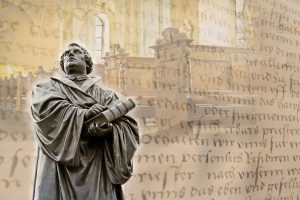The Bell: Thoughts on the Protestant Reformation

Luther’s Psychological Crisis
This makes Luther’s bold act sound a bit academic. Much more personally, Luther was a man in personal crisis. His inner turmoil was his overwhelming anxiety that God had not forgiven and accepted him. It’s not that Luther had committed some horrible sin. Rather, Luther as a fallible human being committed littly sins almost hourly. Martin’s conscious of this continual transgression left him feeling like a condemned man. In the midst of this overwhelming anxiety, Luther’s spiritual director instructed him to become a full time student of the Scriptures. It was in this study, especially in Paul’s letters, that Martin Luther recovered the breathtaking good news that God indeed loved him not by any works under the law or church, but by virtue of pure grace.
At length, Luther realized that the church, the Medieval Roman Catholic Church, held forth a message that missed the graceful heart of the Good News. Hence the 95 Theses. What followed rocked Europe. The tradition of the Protestant Reformation continues to unfold in the energy that was released by that young monk.
Here I Stand
My personal encounter with Luther’s story came when I was 19, and read Roland Bainton’s, Here I Stand, the classic English language biography of Martin Luther. Reading Bainton brought a glorious clarity to my own faith. Bainton tells a story in his book that encapsulates the life of Martin Luther, the life that we celebrate this weekend.
The Bell
Roland Bainton tells of a man stumbling up the spiral stairs of a dark bell tower. His hand falls upon a rope that he uses to pull himself upright. The rope is the bell rope. In pulling on it the man begins to hear the sound of a great bell sounding overhead. For miles around the clear ringing can be heard. One man’s quiet struggle suddenly has an impact on the whole countryside.
This image is as good a summation of the Protestant Reformation that I’ve yet heard.


3 Replies to “The Bell: Thoughts on the Protestant Reformation”
Thanks Doug, I suspect there is a lot our world has neglected and we are missing from the Gospel!
I read the link from Hunsinger- its very interesting. Certainly a lot there to chew on! I’m trying to think how Hunsinger doesn’t just throw out everything Luther gave us?
I tend to not look at “Christianity” as being fractured, but I accept and recognize his premise that the Church (the body of all Christian churches) is not necessarily a unified body. You may need to correct me but I don’t recall any teaching of Jesus emanating from the Bible that contemplates the absolute creation of one unified singular denomination or physical church as we know it ? I agree that one could get to the unified single church — a concept that t me evolves more clearly with what follows the Gospels in the Bible.
Is it fair to say that broader Christianity is relatively unified in its overall belief in Jesus, His life, and His teachings? Is it possible the “Christianity” as we know it is in fact the Holy Catholic Church or are we mandated that we must fall only under one unified “brand”? I wonder if there might be more depth and value in understanding a much broader Christ through multiple Christian denominations than if mankind is limited only to one “packaged” sole unified denomination???? I like hamburgers and confess I have been to Burger King and Wendys. Lots of different flavors of burgers out there. I get a better understanding of what I think might be the best burger made without any one brand telling me they have the only and best burger and that I am stuck with it. But would I only be able to go to Church under the golden arches (McChurch)– with Hunsingers concept? Can’t there be multiple states in the Kingdom? Hey its a really big house! Just thinkin (Yea I know that’s dangerous LOL)
Its interesting to see how society “missed” the Good News of Gods saving grace while it was out there all the time in Paul’s letters and the Gospel. Clearly the lack of widespread literacy during those times, the overarching control of thought by religious figures in the church at that time, and the inability to access the printed Word to study by one’s self must have contributed to the lag in mans ability to better understand what life in Christ was really all about. Sure am happy Martin Luther figured it out! Just thinkin?
Again, you and I are on the same page in wondering at the neglect of certain crucial dimensions of the Gospel. Sometimes this neglect can go on and on and involve the whole church or huge parts of it.
Take the more recent neglect of The Kingdom of God and its recovery. (See Mclaren’s Jesus’ Secret Message) You might be intrigued by the work of Wyatt Houtz, a productive blogger-theologian. His work recently attracted comment by George Hunsinger, the Princeton Theological Seminary professor who, incidentally conducted my daughter, Kim and Mike’s wedding at First Presbyterian–LaGrange. You may have been there. Check this out: http://postbarthian.com/2017/10/30/george-hunsingers-proposal-ending-reformation-reunifying-church/